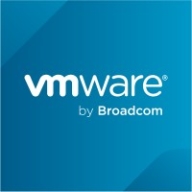

Datadog and VMware Aria Operations for Logs both compete in the observability and log management category. While Datadog has the upper hand due to its extensive integration and cloud-based offerings, VMware excels in environments already leveraging VMware products.
Features: Datadog provides a user-friendly dashboard creation, multiple integrations, and flexible alerting. It supports real-time monitoring and metrics-based alert setups. VMware Aria Operations for Logs offers customization, log centralization, and seamless integration within VMware environments, aiding in detailed log insights and operational efficiencies.
Room for Improvement: Datadog could improve with more granular dashboard sharing, refined API consistency, and comprehensive tutorials. Its pricing model needs more transparency. VMware, on the other hand, should enhance integration with non-VMware tools, improve licensing options, and expand its documentation to be more intuitive.
Ease of Deployment and Customer Service: Datadog is widely deployed in public and hybrid cloud settings, with commendable customer service noted for its responsiveness, though there are occasional delays. VMware Aria Operations for Logs is predominantly on-premises, requiring more configuration for non-VMware environments, with decent support that would benefit from faster and more consistent expert assistance.
Pricing and ROI: Datadog's pricing is high but justified by its comprehensive feature set. Its usage-based billing structure requires careful cost monitoring but delivers ROI through better performance insights. VMware Aria Operations for Logs offers predictable costs within VMware-centric setups, often being more cost-effective due to bundled deals in such environments, though Datadog's broader functionality often provides greater standalone ROI.
Previously we had thirteen contractors doing the monitoring for us, which is now reduced to only five.
Datadog has delivered more than its value through reduced downtime, faster recovery, and infrastructure optimization.
I believe features that would provide a lot of time savings, just enabling you to really narrow down and filter the type of frustration or user interaction that you're looking for.
When I have additional questions, the ticket is updated with actual recommendations or suggestions pointing me in the correct direction.
Overall, the entire Datadog comprehensive experience of support, onboarding, getting everything in there, and having a good line of feedback has been exceptional.
I've had a couple instances where I reached out to Datadog's support team, and they have been really super helpful and very kind, even reaching back out after resolving my issues to check if everything's going well.
While support staff is knowledgeable, getting access to specialists can be challenging when dealing with the limits of a product.
Customer service and support have declined.
I did not need technical support because I am a professional with VMware.
Datadog's scalability has been great as it has been able to grow with our needs.
We did, as a trial, engage the AWS integration, and immediately it found all of our AWS resources and presented them to us.
Datadog's scalability is strong; we've continued to significantly grow our software, and there are processes in place to ensure that as new servers, realms, and environments are introduced, we're able to include them all in Datadog without noticing any performance issues.
Since payment is based on hardware, scalability impacts are managed more effectively than with other tools paid by data volume.
It's relatively easy to find individuals with the skills to work with VMware because it is a widely spread tool.
Datadog is very stable, as there hasn't been any downtime or issues since I've been here, and it's always on time.
Datadog seems stable in my experience without any downtime or reliability issues.
These incidents are related to log service, indexes, and metric capturing issues.
Managing a lot of data involves reliance on hardware and network performance, which are external factors that can affect stability.
It has been very stable, and every time I needed it, it was available and working.
VMware as a whole provides very stable tools.
It would be great to see stronger AI-driven anomaly detection and predictive analytics to help identify potential issues before they impact performance.
The documentation is adequate, but team members coming into a project could benefit from more guided, interactive tutorials, ideally leveraging real-world data.
In future updates, I would like to see AI features included in Datadog for monitoring AI spend and usage to make the product more versatile and appealing for the customer.
It would be beneficial to have a roadmap for these dashboards to ensure consistent functionality.
There is also dissatisfaction with Broadcom's broader attitude, which is prompting me to search for alternatives.
VMware Aria Operations for Logs is not a cost-effective tool.
The setup cost for Datadog is more than $100.
Everybody wants the agent installed, but we only have so many dollars to spread across, so it's been difficult for me to prioritize who will benefit from Datadog at this time.
My experience with pricing, setup cost, and licensing is that it is really expensive.
Splunk, often paid by the terabytes, becomes expensive quickly if not managed carefully.
The price has risen significantly, and for smaller customers, the cost can be up to ten times more than before.
VMware comes with a lot of packages, however, it remains too expensive.
Our architecture is written in several languages, and one area where Datadog particularly shines is in providing first-class support for a multitude of programming languages.
Having all that associated analytics helps me in troubleshooting by not having to bounce around to other tools, which saves me a lot of time.
Datadog was able to find the alerts and trigger to notify our team in a very prompt manner before it got worse, allowing us to promptly adjust and remediate the situation in time.
This tool also provides greater insight when integrated with VMware infrastructure, making it more precise than other tools.
The most valuable features are log centralization and long-term retention for logs.
A valuable feature of VMware Aria Operations for Logs is its ability to allow personalization of dashboards and requests.
| Product | Market Share (%) |
|---|---|
| Datadog | 5.7% |
| VMware Aria Operations for Logs | 1.4% |
| Other | 92.9% |


| Company Size | Count |
|---|---|
| Small Business | 80 |
| Midsize Enterprise | 46 |
| Large Enterprise | 95 |
| Company Size | Count |
|---|---|
| Small Business | 7 |
| Midsize Enterprise | 9 |
| Large Enterprise | 12 |
Datadog integrates extensive monitoring solutions with features like customizable dashboards and real-time alerting, supporting efficient system management. Its seamless integration capabilities with tools like AWS and Slack make it a critical part of cloud infrastructure monitoring.
Datadog offers centralized logging and monitoring, making troubleshooting fast and efficient. It facilitates performance tracking in cloud environments such as AWS and Azure, utilizing tools like EC2 and APM for service management. Custom metrics and alerts improve the ability to respond to issues swiftly, while real-time tools enhance system responsiveness. However, users express the need for improved query performance, a more intuitive UI, and increased integration capabilities. Concerns about the pricing model's complexity have led to calls for greater transparency and control, and additional advanced customization options are sought. Datadog's implementation requires attention to these aspects, with enhanced documentation and onboarding recommended to reduce the learning curve.
What are Datadog's Key Features?In industries like finance and technology, Datadog is implemented for its monitoring capabilities across cloud architectures. Its ability to aggregate logs and provide a unified view enhances reliability in environments demanding high performance. By leveraging real-time insights and integration with platforms like AWS and Azure, organizations in these sectors efficiently manage their cloud infrastructures, ensuring optimal performance and proactive issue resolution.
Manage data at scale with centralized log management, deep operational visibility and intelligent analytics for troubleshooting and auditing across private, hybrid and multi-cloud environments.
We monitor all Log Management reviews to prevent fraudulent reviews and keep review quality high. We do not post reviews by company employees or direct competitors. We validate each review for authenticity via cross-reference with LinkedIn, and personal follow-up with the reviewer when necessary.